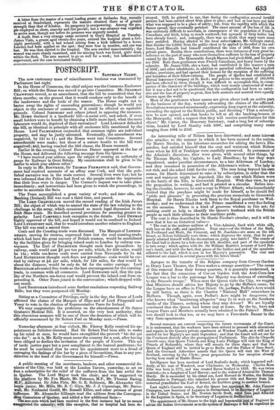POSTSCRIPT.
In the House of Commons, the chief subject was the Commons Enclosure Bill; on which the House was moved to go into Committee. Mr. Summer; CRAWFORD moved, as an amendment, that the bill be committed that day three months; on the ground that it would conduce only to the benefit of the landowners and the lords of the manor. The House ought not to barter away the rights of succeeding generations; though he would not object to the enclosure of commons, if it could be effected on equitable grounds. Colonel Suirrnoar and others joined in opposing the measure. Mr. HUME declared it a landlords' bill—a social evil; and asked, if even anal holders were to benefit by obtaining a little more land, what the mere .labourers would do, deprived of their recreation? Lord Lux:oral defended the bill, as identical in principle with all enclosure bills sanctioned by the House. Lord PALMERSTON contended that common rights are individual property, and may be justly alienated. Eventually, the amendment was negatived, by 121 to 11; and the House went into Committee. Several amendments were made; but those of a nature hostile to the bill were negatived! and, having reached the 32d clause, the House resumed.
Earlier in the evening, Colonel Dawson Darner appeared at the bar of the House, and delivered the following message from the Queen- " I have received your address upon the subject of securing an uniformity of gauge for Railways in Great Britain. My consideration shall be given to the matter to which your address refers." In reply to Mr. Bouvertne, Sir THOMAS FREMANTLE said, that Govern- ment had received accounts of an affray near Cork, and that the pub- lished narrative was in the main correct. Several lives were lost; but he was informed that the Police had fired on the people under the impression that their lives were in danger. The Coroners inquest was to take place immediately; and instructions had been given to watch the proceedings, in larder to ascertain the fitcts.
The Peers accomplished a great variety of work; and inter ilia, the -Banking (Ireland) Bill was read a third time, and passed.
The LORD CHANCELLOR moved the second reading of the Irish Jurors Bill; the object of which was to amend the state of the law relating to the .challenge to the array, which occasioned so much legal discussion in the Irish State trials. He described several provisions for securing greater re- gularity. Lord CAMPBELL took exception to the details. Lord Demur; highly approved of the bill, and hoped it would not be confined to Ireland Lord LYNDHURST said, that he would introduce another relative to England. The bill was read a second time.
Coals and the Coasting-trade were discussed. The Marquis of LONDON- DERRY moving for returns, expressed fears lest the coal coasting-trade, which had been the great nursery of British seamen, would be annihilated by the facilities given for bringing inland coals to London by railway con- veyance. The Earl of DALHOUSIE thought such fears groundless: by railway, coals would cost id. per ton per mile, which, for 250 miles, would be 158.• while sea-borne coals were carried from Newcastle for 7s. 6d. Lord HATHERTON thought such fears not groundless: coals would be car- vied by railway at id. per mile, which, for 150 miles, for that would be about the distance, would be only 6s. 3d. for the entire carriage. Lord BROUGHAM advocated free trade as the best encouragement for the coasting- trade in common with all commerce. Lord KINNAIRD said, that the qua- lity Of the Northern sea-borne coal would prevent the inland coal from su- perseding it. Other Peers joined in the conversation; which dropped with- -out result.
Lord BROUGHAM introduced some further resolutions respecting Railway Bills; but they were postponed till Monday.
Sitting as a Committee of Privilege, early in the day, the House of Lords Affirmed the claims of the Marquis of Sligo and of Lord Fitzgerald and Vesey to vote in the election of Representative Peers for Ireland.
We may congratulate the profession on the abandonment of Sir James Graham's Medical Bill. It is asserted, on the very best authority, that this obnoxious measure will be one of those the desertion of which will be officially announced by Sir Robert Peel on Monday next.—Times.


























 Previous page
Previous page